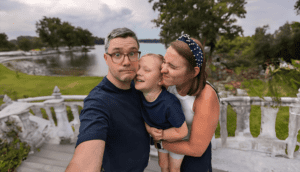Em McCabe is the Founder of the digital marketing web design and branding agency Eb + Flo Digital. Em has been an entrepreneur for three years now, already managing a team of five. In this interview with Follow the Founder creator Annalee, Em talks about her struggles with imposter syndrome when shifting from a freelancer to a business owner and subsequently finding her power as an entrepreneur.
According to medical professionals, imposter syndrome is a behavioral health phenomenon described as self-doubt of intellect, skills, or accomplishments among high-achieving individuals [1]. It is very common when starting a business, especially in those first stages of establishing your leadership and finding the right dynamics within your company. Doubt or fear taking over causes entrepreneurs to set lower goals and expectations, not offer their services at an appropriate price, or ask for help.
The transition of flipping the frame of mind and realizing her position as a business owner after having freelanced for years took a while to truly settle with Em too.
“I didn’t know a single soul who ran a business. No one who was a freelancer. All my friends were at nine-to-five jobs. I felt very alone. The first time I had surrounded myself with other business owners was when I met you [Annalee] in Portugal in 2022. You and a couple of other people repeatedly said to me, ‘You’re running a business, not freelancing’. I’ve never had anyone say that to me. I’d had fears or doubts that I couldn’t do it. But in fact, I was already doing it. I had already done half of the things I was scared of, so why not try and figure out the rest? Surrounding myself with people I could look up to and wanted to be like one day really helped,” Em says.
To realize she was no longer at the mercy of clients reaching out to hire her and in the driver’s seat, capable of hiring a team and targeting whoever she wanted to work with, required a mindset as well as a deeper internal shift. She needed to locate and truly embrace that sense of power over her life and control over her company and its future.
“I was doing absolutely everything myself. I started burning out physically to the point that I was passing out while doing the groceries. When my mindset shifted to understanding I do run a business, and I can ask for help, I brought people in and let go of some of my responsibilities.
“The first person I hired was a developer, a real expert in his field, which was the best decision. He is incredible, we still work together. He could do some of the specific tasks in half the time it took me. Freeing up time allowed me to bring more clients and grow the business. I’ve hired someone for social media too, and I’ve got the most amazing PA, Sam. I’ve been able to have time off. This is the first Christmas I’ve not worked since I started the business. I didn’t even look at my emails for the first time in nearly four years.”
Understanding the value of our time is intrinsically tied up with battling imposter syndrome. When she started, Em felt she had to help clients indefinitely and grant their requests, even if they asked for something months after their project was completed. But after experiencing this power shift, she took that power back and said no or charged extra. It turned out clients were more than happy to pay for the work done on top. This, combined with creating a bigger team to support her, silenced that little imposter syndrome voice in her head, helping her enjoy the fruits of her labor and find balance in her life.
“It’s something I wish I’d done from day one. Maybe I didn’t because I didn’t have that network of people around me I could go to. No one in my family or my friends runs a business, so I had no one to ask.”
Whether it’s surrounding yourself with the right people or finding the courage to ask for help, finding your power and acknowledging how far you’ve come can be a true antidote to feeling like an imposter in your own business and sabotaging your success. But either way, you’re not alone in the struggle of self-doubt.
Connect to many like-minded individuals and find a supportive and inspiring environment by joining the Follow the Founder family. You can also find us on Instagram @followthefounder.
References:
[1] Imposter Phenomenon, Martin R. Huecker; Jacob Shreffler; Patrick T. McKeny; David Davis, In: StatPearls [Internet]. Treasure Island (FL): StatPearls Publishing; 2023 Jan-. Available from: https://www.ncbi.nlm.nih.gov/books/NBK585058/#








